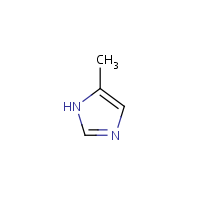4-Methylimidazole
Agent Name
4-Methylimidazole
CAS Number
822-36-6
Formula
C4-H6-N2
Major Category
Nitrogen Compounds

Synonyms
4(or 5)-Methylimidazole; 4-Me-i; 1H-Imidazole, 4-methyl-; 1H-Imidazole, 5-methyl-; 4-Methyl-1H-imidazole; Imidazole, 4-methyl-; [ChemIDplus] 4MI; [HSDB]
Category
Imidazoles
Description
Solid; [HSDB] Light yellow solid; [NTP] Light yellow powder; [Sigma-Aldrich MSDS]
Sources/Uses
Used to make pharmaceuticals, antiseptic agents, and photo developing solutions; [HSDB] Present in caramel coloring, tobacco smoke, wine, soy sauce, and other foods; Also formed when ammonia is added to livestock feed to increase nutritional value; Used to make pharmaceuticals, photographic and photothermographic chemicals, dyes, pigments, agricultural chemicals, rubber, and inks; Also used in oven cleaners, as a crosslinking agent for epoxy resin hardeners, corrosion inhibitor for cooling water, and in absorbents that remove acid gases from hydrocarbon or synthesis gas; [NTP]
Comments
No histopathological changes observed in 15-day oral studies of rats and mice; 14-week oral studies produced tremors, ataxia, anemia, hepatocytic vacuolization, and testicular degeneration in rats and anemia, liver cytoplasmic vacuolization, and renal degeneration in mice; Histopathological liver changes also observed in 106-week oral study of rats; [HSDB] Causes neurological effects including hyperexcitability, convulsions, and seizures in livestock and experimental animals; Reproductive organ toxicity and decreased fertility observed in male rats; Evidence of carcinogenicity: none in male rats; equivocal in female rats; clear evidence in male and female mice; [NTP] Irritating or corrosive to skin and irritating to eyes in rabbits; [IUCLID] Causes burns; Inhalation may cause corrosive injuries to upper respiratory tract and lungs; Harmful by ingestion; [Sigma-Aldrich MSDS] See "2-Methylimidazole."
Reference Link #1
Biomedical References
Exposure Assessment
Vapor Pressure
0.015 mm Hg
Explanatory Notes
VP from ChemIDplus;
Adverse Effects
Toxic Pneumonitis
Yes
Neurotoxin
Other CNS neurotoxin
Hepatotoxin
Hepatoxic (a) from occupational exposure (secondary effect) or (b) in animal studies or in humans after ingestion
Dermatotoxin
Skin burns
IARC Carcinogen
Possible (2b)
Diseases, Processes, and Activities Linked to This Agent
Processes
Industrial Processes with risk of exposure: